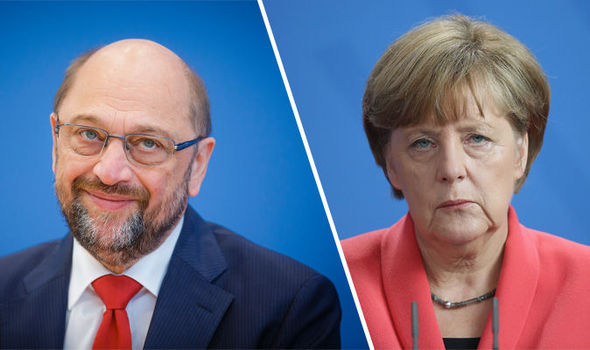A 'Schulz effect' in German politics?
china.org.cn / chinagate.cn by George N. Tzogopoulos, March 9, 2017 Adjust font size:
|
|
|
Current opinion polls indicate Schulz is more popular than Angela Merkel. |
If there is any EU country where stability is taken for granted and future perspectives are optimistic, this surely will be Germany. After 12 years at the helm as chancellor by conservative leader Angela Merkel, however, some Germans are no longer averse to political change.
The next election ("Bundestagwahl") has been set for September 24. Until recently the Christian Democratic Union (CDU) and its sister Christian Social Union (CSU) had been seen as favorites to continue their political dominance. The Social Democratic Party (SPD) - although part of a grand coalition in the last four years - had been regarded as obsolete to offer an effective challenge.
Former leader of SPD, and current Foreign Minister Sigmar Gabriel, acknowledged the risk of another lost election, hence, he decided to step down in favor of Martin Schulz, former president of the European Parliament, who has brought about a wave of enthusiasm among disenchanted voters of the center-left political spectrum, who, for the moment, like what they see.
Current opinion polls indicate Schulz is more popular than Angela Merkel. More importantly, the SPD has gone beyond 30 percent threshold for potential votes in all surveys while its percentage under Gabriel had been less than 25 percent. All of this suggests, the result of the September 24 election is more open than in the pre-Schulz period.
Hence, a growing number of analysts and journalists are beginning to talk of a "Schulz effect" in German politics. Traditionally, German politicians holding top EU jobs are considered "politically dead" in their own country. Indeed, this had also been the case with Schulz in the past.
In the European election of May 2014, he faced Jean Claude Juncker for the position of president of the European Commission. Yet, he failed to inspire German citizens despite their common nationality.
Although it's the same Schulz, the situation three years later differs for one main reason. Chancellor Merkel has caused some unhappiness with her "open door" policy on refugees. Recent terrorist attacks in some German cities - especially the Christmas market attack in Berlin - has increased a sense of unsafety and xenophobia.
As a result, Merkel is no longer portrayed as the incomparable national leader. Her image, indeed, is slipping. The general criticism of her, starting from her management of the refugee crisis, is also expanding into other aspects of politics so that some voters are keen to find an alternative.
This explains the rise of small parties such as the Alternative for Germany (AFD) and the Liberals (FDP) irrespective of their political orientation or extreme character. And it now explains the rise of SPD, boosted by the leadership change.
Martin Schulz is a very experienced and smart politician. He knows that SPD will not preserve its current high percentage if he does not persuade public opinion that he can implement a new political program. Supporting the grand coalition, the party has agreed with the CDU and CSU on almost all of critical political decision. So, it now needs to find some departure points.
As President of the European Parliament, Schulz stood beside Merkel on various fronts, including the refugee crisis! His only disagreement was on dealing with the European economic crisis, where he is more open to the "mutualization of debt" proposal, which is an anathema to conservatives.
However, he will possibly bury this issue during the pre-election campaign due to its sensitivity for the German audience and a possible political cost for himself. Instead, he seeks to draw a line between himself and his predecessor by moving the SPD more towards the Left.
In a recent important speech, he distanced "himself" from Gerhard Schroeder's "Agenda 2010." This concept set the basis for the reform of the German social security system and the labor market and, ultimately, the country's economic progress and growth.
By promising "social justice," Schulz can certainly give a new political direction to his party. He has also showing willing on a future political coalition between the SPD, the Greens and the Left, as is currently happening at the regional level in Berlin and Thuringia, even if the CDU and CSU win the September election.
Nevertheless, a problem for Schulz is that September 24 is a long way off. His economic agenda may sound attractive, but is already being picked apart by serious scholars as a threat to the national economy.
And Germany is a country where the rational elements in economics and politics have so far not given way to the populism and the illusions seen in other European countries. It is the efficiency and sustainability that matter more than mere words or pre-election promises.
George N. Tzogopoulos is a columnist with China.org.cn. For more information please visit:
http://www.china.org.cn/opinion/GeorgeNTzogopoulos.htm
Opinion articles reflect the views of their authors, not necessarily those of China.org.cn.
